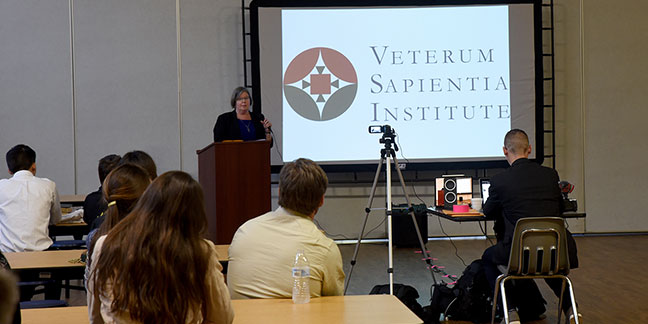‘Veterum Sapientia’ to offer online classes starting in January
 CHARLOTTE — An effort to promote the study and use of Latin among Catholics has been launched in the Diocese of Charlotte.
CHARLOTTE — An effort to promote the study and use of Latin among Catholics has been launched in the Diocese of Charlotte.
The Veterum Sapientia Institute will offer courses in Latin and Greek taught online by clergy and professors from the diocese and around the world, starting Jan. 11.
The new institute is the outgrowth of eight successful Latin conferences hosted in the Charlotte area since 2013, noted Father Jason Barone, who serves at parishes in Sapphire and Highlands and is one of the institute’s co-founders. Its name comes from St. John XXIII’s 1962 apostolic constitution that defended and promoted the study of Latin in seminaries.
A cleric who helped organize the annual Latin conferences, Father Barone said the new Veterum Sapientia Institute “hopes to assist in the long-delayed realization of the pope’s vision for the Church’s official language of Latin.”
Father Barone will serve as one of the Veterum Sapientia Institute’s directors and he will teach courses in liturgical theology for seminarians, priests and religious.
Also being offered to the general public are introductory classes in spoken Latin and spoken Greek, as well as in-depth courses in patristic and scholastic theology. Initial class offerings include St. Thomas Aquinas’ Summa Theologica, St. Augustine’s Commentary on the Gospel of John, Sayings of the Desert Fathers, and Orations of the Missal.
Courses are being taught by Dr. Nancy Llewellyn, one of the co-founders of the Veterum Sapientia Institute along with Dr. Eric Hewett. Llewellyn, an associate professor of Latin at Belmont Abbey College and Latin instructor at St. Joseph College Seminary, will serve as the institute’s vice president. Hewett, who teaches Latin and Greek at the seminary of the Priestly Fraternity of St. Peter in Bavaria, Germany, will serve as president.
Other faculty include Father Dylan Schrader of the Diocese of Jefferson City, Mo.; Dr. Daniel Gallagher of Cornell University; as well as instructors Dr. Jonathan Arrington, Dr. John Pepino and Dr. Alex Petkas.
The continuing importance of Latin to the Church was underscored by St. John XXIII in his 1962 apostolic constitution. “The employment of Latin has recently been contested in many quarters, and many are asking what the mind of the Apostolic See is in this matter,” the pope wrote. “We have therefore decided to issue the timely directives contained in this document, so as to ensure that the ancient and uninterrupted use of Latin be maintained and, where necessary, restored.”
The Church’s Latin heritage remains every Catholic’s birthright, Father Barone said, and the opportunity to learn the language should not be limited to a lucky few.
Priests, in particular, are still by statute expected to become fluent in Latin.
Father Barone said the Veterum Sapientia Institute is finalizing an agreement for accreditation and a “Diploma in Latin Letters” with the Pontifical Institute for Higher Latin at the Pontifical Salesian University in Rome, which was tasked with fostering Latin in the Church by St. Paul VI in 1964.
Registration for Spring 2021 courses is now open. Online classes begin Monday, Jan. 11, and end by Friday, March 26.
In general, courses will meet online 10 times during an 11-week term, with classes lasting one hour. Longer-format courses will meet twice a week for 45 minutes each.
— SueAnn Howell, Senior reporter
For more info
At www.veterumsapientia.org: Learn more about the Veterum Sapientia Institute and register for online classes that will begin in January.
Pictured: Dr. Nancy Llewellyn, a co-founder and co-director of the newly formed Veterum Sapientia Institute, addresses those gathered Nov. 22 at the Allen Center at St. Ann Church in Charlotte to announce the institute’s launch. (Photo Provided by Markus Kuncoro)

